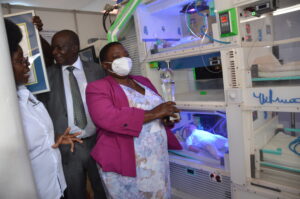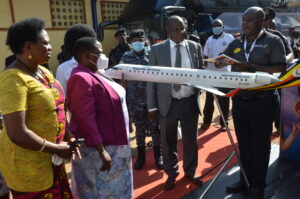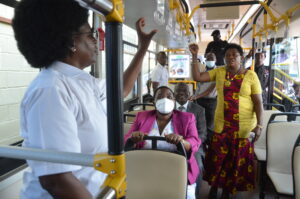By: Ismael Kasooha
Kampala
President Yoweri Museveni has said that Uganda supports the integration of the East African and African market of 1.2 billion people because a bigger market is good news for Uganda’s surplus commodities.
This was contained in a message delivered for him by the Prime Minister of Uganda, Rt. Hon. Robinah Nabbanja at the closure of the 28th Uganda Manufacturers’ Association Trade Fair and the first since the COVID -19 pandemic hit the world.
President Museveni said that the NRM Government was spot-on right from the beginning and prioritized the integration of East Africa and Africa for bigger markets.
“Luckily for Uganda, the NRM understood the necessity of big markets quite early and started working towards the economic integration of East Africa to benefit from the bigger regional and continental market of Africa. We cannot be satisfied with Uganda’s small market of only 42 million people. This cannot guarantee our prosperity,” said the president.
He said that Uganda’s business prospects are bright and urged all Ugandans and foreign investors to harness the economic opportunities, which are abundant in all parts of the Country, to create wealth and jobs.
The went on to thank the manufacturers for demonstrating Uganda’s potential as a powerful industrial and business hub in the East African region and Africa.

The Prime Minister Rt. Hon. Nabbanja Robinah inspecting the biggest baby incubator at the UMA show grounds at the closure of the 28th trade fair
“Uganda’s industrialization journey is unstoppable and the government will continue to provide a business friendly environment for both local and foreign investors,” the speech read in part.
He said that when the NRM government took over power in 1986, the economy of Uganda had been completely crumpled.
“The NRM was faced with an enormous task of re-focusing the economy from the disaster of total collapse to the progressive road of revival, equitable socio-economic transformation and prosperity for all. As a result, we have been able to transform a tragedy into a success story,” he added.
The president said that the NRM government was able to transform the economy because they followed the principle of correct prioritization.
This means investing in the most crucial sectors of the economy, which in turn serve as catalysts for business growth and development.

The Prime Minister and other ministers and UMA officials at the Uganda Airlines stall in Lugogo show grounds
“These catalysts are: the good road network, enough electricity supply, hospitals, schools, peace, stability and security. These development projects, which have been largely funded by the Uganda Government, have improved the investment potential of Uganda by lowering the costs of doing business; thus, giving confidence to investors,” said Museveni.
He said that Uganda boasts of tarmacked roads from border to border. Without electricity, roads, the railway, water transport, telecommunications, and ICT backbone etc. businesses cannot thrive.
“How can you transport farm produce if you do not have roads? How will you manufacture or run hotels if you do not have electricity? Therefore, by prioritizing investment in the development of physical infrastructure, the NRM ignited Uganda’s economy. We started Uganda’s industrial revolution which has now taken root in all parts of the country,” said the president.
He said that there are four sectors where households can create wealth and jobs for our young people and these are: commercial agriculture; industries (big or small); services (hotels, transport, professional services, shops, etc.); and ICT (Business Process Outsourcing (BPOs).
“These are the four pillars of a modern money economy, from which Ugandans can select a profitable enterprise that suits them.
The prevalence of poverty and low standards of living among Ugandan households is mainly due to subsistence farming; working for the stomach only. 39% of the households in Uganda must be redeemed from working only for the stomach. This is dangerous in the modern era where all goods and services needed to sustain life must be bought with money,” emphasized the president.

The Minister for Science, Technology and Innovations Dr. Monica Musenero (left) explains to the Prime Minister (seated centre with mask) how the the electric bus works.
He said that as more and more Ugandans wake up to join the ranks of producers as commercial farmers, service providers, industrialists etc. the issue of the market will become central.
The giant economies like the USA, China, India etc. are backed by big markets. If you produce on a large scale, you must have a big market to consume your products and services.
The president commended Uganda Manufacturers’ Association for organizing this year’s trade fair to show case Uganda’s products to the rest of the world.
Harriet Ntabaazi, representing the Minister for Trade said the quality of goods manufactured was good and put Uganda in a better position to compete in the world market.
Deo Kayemba, UMA Chairman , said that government needed to protect manufacturers in regard to taxes for their survival and continuity.
The manufacturers and exhibitors were happy that the trade fair was making milestones in show casing Uganda’s capacity and promised to continue participating in the event.
Different companies were awarded with prizes for their effort in the exhibition.
The theme for this year’s trade fair was “Business recovery by harnessing local sourcing and deepening value chain integration”.
End





